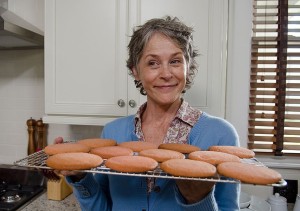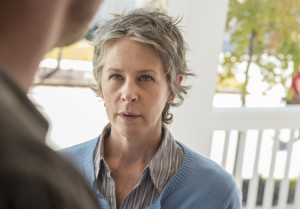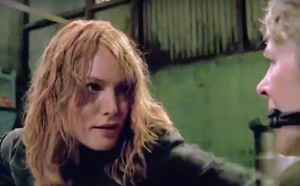Let’s talk about Carol some more.
She doesn’t like the person she’s become. She’s a killer — who has only killed to protect herself and her friends. But a killer nonetheless and now she’s having to grapple in the new calm — a reprieve from constant combat — with the realization that she’s finally found something outside the realm of enforced domesticity that she’s good at, and it turns out to be that her new expertise is as a ruthless incredibly effective death-dealer. A person who scares people. Unwittingly, with the best of intentions, but scares them nonetheless.
She sits alone on her bed and makes a list in her notebook of all the human beings she’s ended. And it’s 18 people, as far as she can remember. It could be more. She lost count.
She doesn’t like who she’s become even if it turns out that she likes the thrill of combat, craves the electricity it sparks across the skein of the world, lighting dark corners that should not be lit, never be lit.
Later when she’s captured and on the floor crying, her captors think she’s afraid. And in a way she is — but not of them. She’s afraid that she’s going to have to slaughter them all and she doesn’t want to. No, that’s not quite right. She wants to not want to. In her captor, the woman who is so hard, so jaded, that she’d murder another pregnant woman without a second thought, she sees herself or perhaps a future self if she continues walking her current path.
And Carol always gets the best lines. When her captor asks Carol, still under the illusion that she’s afraid of them, “Are you going to kill me, little bird?” Carol answers, “I hope not.” 
The wish is sincere, but Carol knows what she will have to do to escape and how it will play out. The people who captured her though dangerous are rank amateurs compared to her. And Melissa McBride being a great actor delivers the line perfectly, with the edge of threat admixed with the air of truth. The line steals the air from the room. That’s when her captors begin to get an inkling that they’ve not captured some affrighted little nestling but pure monstrous chaos dressed up like a timid housewife.

Melissa McBride as Carol Peletier – The Walking Dead _ Season 5, Episode 14 – Photo Credit: Gene Page/AMC
Alicia Witt as Paula (Carol’s captor) in this episode is also just a wonder. She packs so much pathos and darkness into 42 minutes that it’s hard to believe. Just a command performance from Witt. Unbelievably well-done.
Carol is experiencing PTSD. She has a panic attack while being held, further leading her captors to believe she’s weak. But she’s panicking because she knows that she can and will kill them all. She was out of combat for long enough that a normal life seemed possible. She met a guy she liked. A guy who is a little afraid of her, but who likes her, too.
And then attempting to protect someone she’s thrown back into it again.
The situation forces her hand, but oh how her hand wants to reach for that gun, that knife, to strike that death blow, to pull the trigger over and over until everything in sight that was moving is forever stilled.
Carol has found her talent, or it has found her, but it turns out that like a lot of feelings and situations that just show up in life unbidden, it is antithetical to who we thought we were and who we want to be.
 There is, she knows, no way this ends well. She cannot go back to who she was. That person is long dead. But she cannot continue to be who she is. That is not a way to live, not even a way to survive but rather one where she is just the same as the walking dead — some very much corporeal ghosts she herself has created — all around her.
There is, she knows, no way this ends well. She cannot go back to who she was. That person is long dead. But she cannot continue to be who she is. That is not a way to live, not even a way to survive but rather one where she is just the same as the walking dead — some very much corporeal ghosts she herself has created — all around her.
At the meta level, I am glad the writers of the show built up the mythos of the gunslinger and then are now tearing it apart — showing that it is a form of death worship, unsustainable if fascinating and exciting.
It was easier to pull this off with a woman character who even with our best intentions we still see as softer, gentler. And then we get Carol handing out death like a modern Abaddon. Then she has a Scrooge-like premonition of her future self in the form of Paula to further reinforce the idea that her prospects are not bright, that no one’s can be when death is all that is over the horizon. Having Carol’s captor also be a woman who is so broken by constant killing that she can’t even realize how broken she is also allows this idea the room it needs to breathe.
I could write books about this — but Carol is the most interesting, the most fully fleshed out and the most fascinating character I’ve ever seen on television. Melissa McBride should win all the awards for making her live. Carol is more real than some real people.
And The Walking Dead amazingly still continues to be the best-written, tightest and best-acted show on television by a damn far margin.
Fun notes:
- It’s heart-wrenching when Carol stops and composes herself to impersonate the now-dead Paula on the walkie-talkie.
- When Darryl at the end after Carol and Maggie have rescued themselves asks her, “Are you good?” and she says, “No.” Notice that it was not, “Are you ok?” It fit perfectly with something Darryl would say and has said, but also had a much larger meaning. So well done.
- The last men Carol kills, she kills on the “kill floor” of a former slaughterhouse, which is where Carol and Maggie were being held. She literally had the enemy meet her on the “kill floor” by impersonating Paula. Dang.